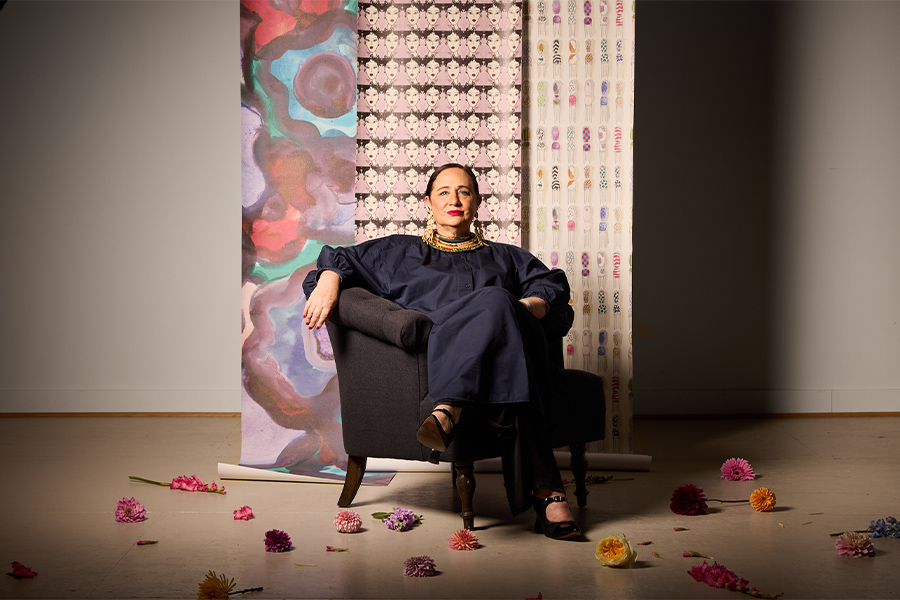At 10 years old, Suchi Reddy felt different from her friends. Growing up in Chennai, India, she was surrounded by the lively sights and colors of the city, but it was her house that set her apart. “It was a protagonist in my life,” she says. “It taught me that the way you feel in a space actually changes you.” One of a few houses that was designed by an architect—unusual in those days—it was built in a Japanese style with a central courtyard surrounded by gardens on four sides. If the house was the main character, her mother was the storyteller. “There were all these textures that I was fascinated by that she came up with,” she says. Together, they cultivated Reddy’s design motto—form follows feeling—that’s been honed at Reddymade, the New York-based architecture and design practice she founded in 2002.
Reddy cemented her design philosophy when she moved to the U.S. at 18, living in Detroit (where she finished her architecture degree at the University of Detroit Mercy); Birmingham, Alabama; West Virginia; and Florida, which revealed to her that America is not a homogenous country. “Every place has its vernacular, it’s locality. As an architect, you have to understand the spirit of the place in order to do work that’s relevant. It’s why I’m against a global style of architecture where you take something that works in one country and plunk it in the other.”

Designed in collaboration with artist Ai Weiwei, this Salt Point, New York home was conceived as a hexagonal extrusion
That is evident in each of her projects, which marry a modern design approach with her interest in a discipline called neuroaesthetics, the examination of how visual aesthetics impact our bodies and minds. “The same parts of your brain that teach you to think about the future are the same ones that are manipulated by your experience of space,” she explains. “The better your space is, the better you are going to be. When you think about that and you extend that over the entire world, it’s a huge responsibility to make sure we’re designing great spaces for everyone.”
Consider Reddymade’s work for Google’s first retail store, located on the ground floor of the former Port Authority Building in New York’s Chelsea neighborhood, which is home to the company’s headquarters. Reddy wanted the space to be as humanizing as Google’s products. “That’s what the architecture had to do. It couldn’t be anything else,” she says. The result of a close collaboration with Ivy Ross, Google’s vice president of design, UX, and research for its hardware products, the design inspires wonder and exploration. At the entrance, for example, tubes of extruded glass suspended between the floor and ceiling form the Imagination Space. The store also features a slew of sustainable materials that helped the project achieve a LEED Platinum status, including flooring made from 100 percent recycled factory waste, acoustic panels crafted with a felt finish from 100 percent PET Plastic, and cork furniture.

A gravity-defying metal line twists its way through Google’s first retail store in New York
Reddy is pushing those principles even further in her next project, a collaboration with Amazon Web Services (AWS) on “me + you,” an interactive two-story installation set to debut in November in the Smithsonian as the centerpiece of FUTURES, a building-wide exploration of the future. Incorporating artificial intelligence (AI) and machine learning, guests speak a word about the future into the sculpture, and using algorithms, the vibration of “your voice, your pitch, your emotion” is translated into a pattern of light that is woven together to give people their own emotional imprint, as Reddy describes it. “It’s constantly changing, but it’s also telling us about our individual agency and our collective responsibility,” she says. “I want people to be self aware when they talk about the future.”
Reddy is as cerebral as she is empathetic—a juxtaposition that has helped her find balance in her work. “I love sitting with a project and really plugging in all of the influences,” she says. “[The idea] expresses itself in whatever way it should. I’m just a channel.”

A rendering of Reddy’s “me + you” installation, set to debut in November in the Smithsonian
This article originally appeared in HD’s August 2021 issue.
More from HD:
NoMad London Captures a New York Sensibility
What I’ve Learned Podcast: Naomi Heaton
3 Forward-Thinking Experiential Retail Concepts


